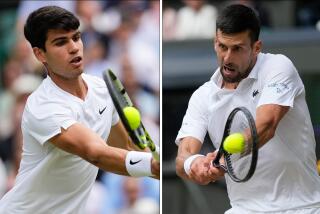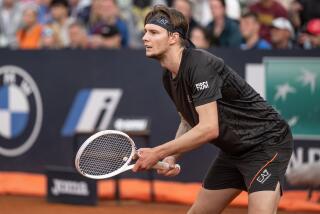Nations the Same, but Roles Changed in Davis Cup Final
It was snowing last weekend in Vaxjo, Sweden, where Stefan Edberg stopped to practice; and it was raining in Stuttgart, West Germany, when he got there this week. Storms, lightning and thunder? As usual, they accompany an introduction to Boris Becker.
One of the most prestigious events in tennis begins today in Beckerâs back yard, where, in perhaps this sportâs ultimate twist, money is not the object. No, nationalism is at stake this weekend, the bragging rights of not just Europe, but the world of tennis.
The Davis Cup, a competition that began in 1900, will be either taken away by challenger Sweden or retained by defending champion West Germany in a rematch of last yearâs final at Goteborg, where then-challenger West Germany took the title held by defending champion Sweden.
Not only was it a classic case of role reversal, it was also classic tennis.
There was Mats Wilander, the No. 1 player in the world, taking the first two sets from Carl-Uwe Steeb but ultimately losing the match. There was Edberg cut out like a Christmas cookie by Becker. Finally, there was the vaunted Swedish doubles team of Edberg and Anders Jarryd winning the first two sets, only to fall in five sets to Becker and Eric Jelen.
The title clinched at 3-0, West Germany closed it out, 4-1, for its first Davis Cup championship. Becker, a three-time Wimbledon champion and the U.S. Open champion, put West Germanyâs Davis Cup victory into perspective.
âTo win the Davis Cup is the all-time highlight of my career,â Becker said. âWe won it, 3-0, on the second day against Sweden on clay in their home court.â
Now, Sweden has the chance to do the same thing to West Germany. While working out in Vaxjo, Edberg considered the similarities between this year and last. He had chosen Vaxjo because there was one court in the city that had the same kind of indoor carpet, called Pegulan, that will be used in the final.
His head cold was gone, the one that bothered Edberg during the week he was in New York, where he won the Nabisco Masters tournament. But the kind of suffocating pressure that can grip your nerve endings, travel up your arms and paralyze your racket, well, theyâre still going to be around.
For most of the decade, the Swedes have lived in the Davis Cup final. This is Swedenâs seventh consecutive appearance, with three victories. It should also be noted that the holder of the Davis Cup has failed to keep it each of the last three years. If all this indicates that this is Swedenâs year, well, it probably depends on Becker, the principal West German.
His best year on the Grand Prix circuit having been concluded with two Grand Slam victories, Becker can finish in even grander style by successfully defending his countryâs Davis Cup title.
Like everyone else, Edberg is wary of Becker.
âBecker is the German team,â Edberg said simply. âHe really is. Of course, we cannot forget Steeb, who is a very good player as well.â
This would be sound advice. When the United States played West Germany in July, Andre Agassi called matches against Steeb âa gimme,â then promptly went out and lost to him. Steeb is ranked No. 15 in the world.
The Swedes will use Edberg and probably Wilander against Becker and Steeb, while Edberg and Jarryd are likely to play doubles against Becker and Jelen. Beckerâs 13-3 record against top-10 players was the best in Grand Prix competition.
There is a chance the doubles match may decide the final, but only if there is consistency from Wilander, Swedenâs biggest variable. Wilander sank like a stone in the rankings in 1989, plunging from No. 1 to No. 12, and was 0-3 against opponents in the top 10.
âI think itâs a little bit uncertain how Mats is going to perform,â Edberg said. âI mean, heâs very eagerly practicing now, which is a good sign, but itâs totally different when they call time and you play a match.â
To get to the final, Sweden defeated Italy, 4-1; Austria, 3-2, and Yugoslavia, 4-1. West Germany made it by beating Indonesia, 5-0; Czechoslovakia, 3-2, and the United States, 3-2.
Just reaching the final has been something of a tradition for Sweden, which has been the runner-up 14 times. Edberg said this weekendâs final in Stuttgart will be followed closely by his countrymen. And why not?
âThe Davis Cup has meant a lot to me and, of course, to the Swedish people, who have been taking a lot of interest in the Davis Cup because . . . we have done so well in the past,â Edberg said. âThere is a lot of tradition; it takes us a long way back. Itâs one of the greatest things in tennis. Youâve got the four Grand Slams, youâve got Davis Cup. And itâs really, really big in Sweden.
âYes, West Germany, they are favorites coming in, but it is a little bit around to what it was last year because we were slightly the favorites, playing at home,â he said. âBut I guess weâre in their position. We feel like weâve got nothing to lose. Hopefully, we can take the title back to Sweden.â
More to Read
Go beyond the scoreboard
Get the latest on L.A.'s teams in the daily Sports Report newsletter.
You may occasionally receive promotional content from the Los Angeles Times.










